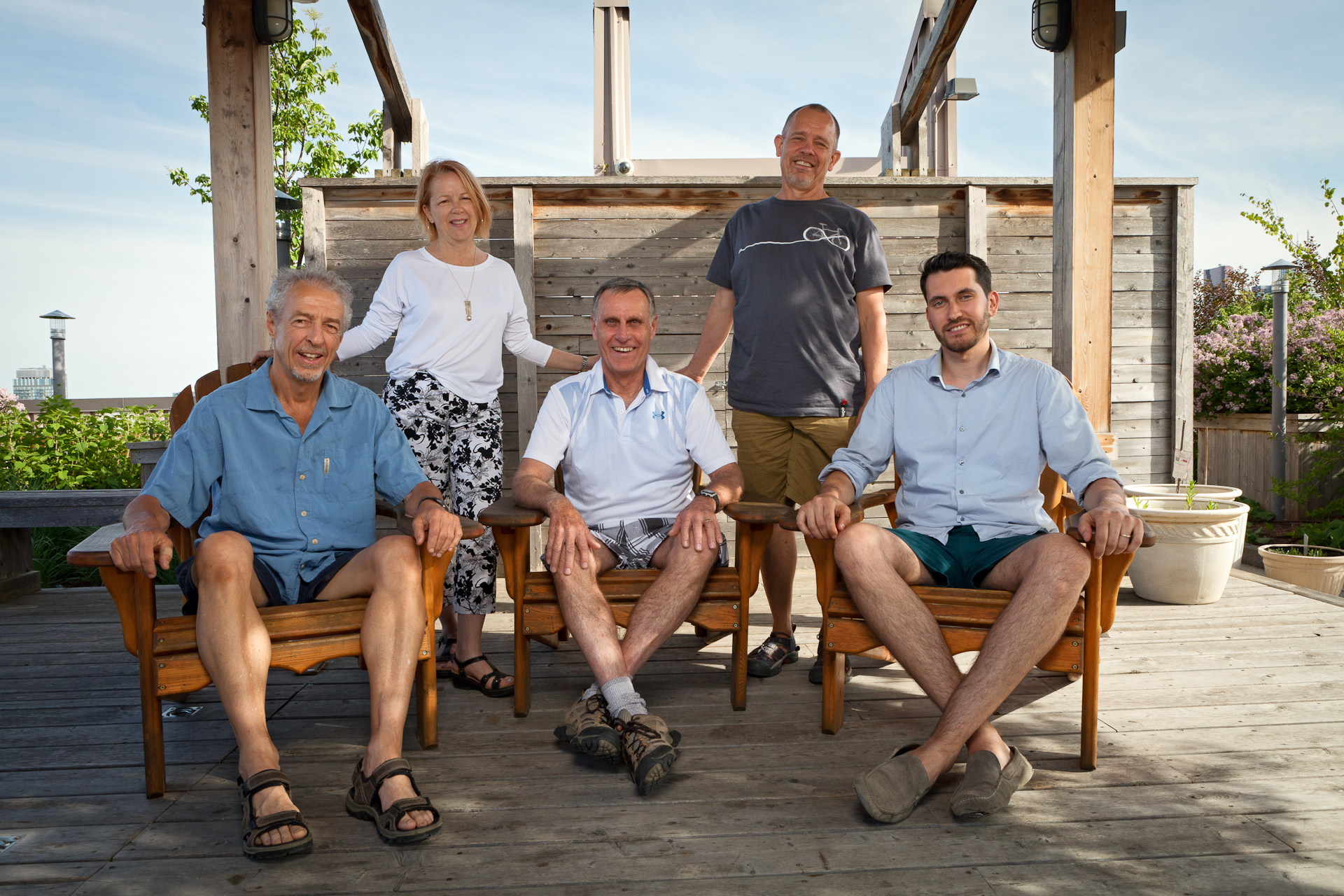Ariel: I want to begin by asking you how Quest got started and why.
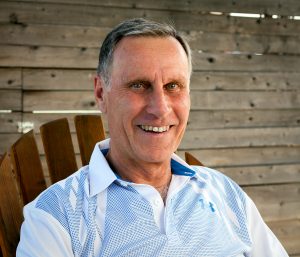 Don: John and I were running an alternative type of program at Jesse Ketchum, a grade 7 and 8 public school in downtown Toronto. We had a principal who couldn’t care less about grade 7 and 8—I’m not sure he ever came to the third floor, where most of that school was. So we pretty well had free rein: we organized everything in the school in terms of special activities and trips. A couple of things came to fruition at the same time. First of all, our classes became very popular, and it became a political hassle for the office, because everyone wanted to be in our program. We could see the really neat kids who were falling through the cracks. John and I were friends, and we started talking one day, and I remember he said, “It would be nice if we could run our own school.”
Don: John and I were running an alternative type of program at Jesse Ketchum, a grade 7 and 8 public school in downtown Toronto. We had a principal who couldn’t care less about grade 7 and 8—I’m not sure he ever came to the third floor, where most of that school was. So we pretty well had free rein: we organized everything in the school in terms of special activities and trips. A couple of things came to fruition at the same time. First of all, our classes became very popular, and it became a political hassle for the office, because everyone wanted to be in our program. We could see the really neat kids who were falling through the cracks. John and I were friends, and we started talking one day, and I remember he said, “It would be nice if we could run our own school.”
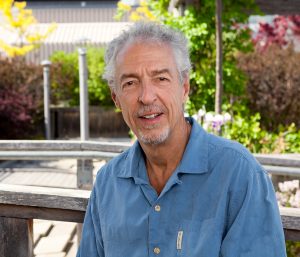 John: And one other factor: we used to study Ecology for three weeks, during which time our students never wanted to go to French class, or Music class, or Math class.
John: And one other factor: we used to study Ecology for three weeks, during which time our students never wanted to go to French class, or Music class, or Math class.
Don: This is still at Jesse Ketchum.
John: We would set up some very exciting stuff. In those days, the late seventies, nobody knew what ecology was. We’d have Greenpeace come in to talk, and we’d have Imperial Oil come in and talk the next day, and they would get some tough questions from our students. It was quite exciting. The students would get permission to miss their [other] classes a few times, but their teachers would get upset, because how were they going to cover the course?
Don: With some of the more exciting trips that we did, like camping in Tobermory, we’d end up with political pressure, where we’d not only have to organize everything for the camping trip, we’d have to organize what the students were doing back in the city, which was a real pain in the butt.
John: And sometimes we’d have trouble getting the required number of staff on the camping trip because they didn’t want to live in tents. We’d have to rent a Winnebago so they’d have the comforts of home.
Don: But once we got them up there they were okay.
John: Which went very well the time we had the huge storm.
Don: But my point is that if we started our own school, it wouldn’t be that much more work than we were already doing, and it would eliminate a lot of the headaches. We started talking about it, and put in our letter of intent …
John: And the atmosphere in Toronto at that point—the groundwork had already been laid by ALPHA and SEED and all those other schools. It was a slam-dunk. We went to the meeting to get our school approved and after we sat through the meeting the woman who was our go-between came and said, “Oh, it got passed in the first ten minutes.”
Don: We were told to be there at a certain time, and we came early, but we were still too late to see the Board of Education approve our school.
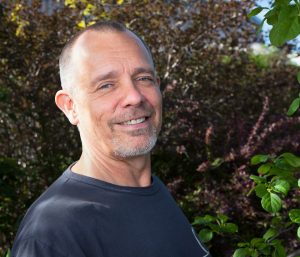 Wade: Things were so casual in those days! This would have been the third public senior school, after Horizon and Spectrum?
Wade: Things were so casual in those days! This would have been the third public senior school, after Horizon and Spectrum?
Don: Delta came in at the same time. We had the advantage that John had a friend who was at Spectrum through its formative years, and he was able to prep us.
John: Brian Taylor
Don: I gather we did such a good job with our model that it became a model for other alternative schools. Brian’s advice saved us a lot of grief.
John: Our motto was, “Structure to Learn, Freedom to Grow,” and that seemed to work for them at the Board downtown, providing a structure, which, as you know, not all alternative schools do. We had some serious structure.
Don: Yeah, we did.
John: We had definite demands.
Ariel: Did the kids take part in defining that structure?
John: Not really.
Don: No. We were different from a lot of other alternative schools.
John: Elementary alternative schools are almost always set up by parents; above that age it’s almost always set up by teachers. Delta was staff-initiated, so were Quest and East.
Don: I had taught at senior school for seventeen years at that point in time, and so I had a good handle on what worked and what didn’t work. I wasn’t really interested in having parents, who were having their first shot with adolescents, interfering. John and I went on our experience. We were able to get Marta LeGrady, also at Jesse Ketchum at the time, to become our third teacher. She was very good because she’d taken the principal’s course. She could help us with some of the nitty-gritty of dealing with the Board.
John: Don, you had developed math games for your math textbook, and some geography games.
Don: Yeah, and a history game. I already had a geography game that was played throughout Brazil.
John: So we had the basis for simulations and immersions that were a big part of Quest. There are still former students I bump into, and they remember those sorts of things.
Jason: I think it’s because if you do something every week, especially at that age, that experience is really defined. It’s more than just a typical lesson, and that’s what you remember. I’ve been doing Mock Parliament every Wednesday in the afternoon. Of course they’re going to remember that. It’s impossible for them not to.
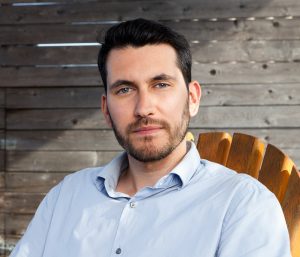 Ariel: Describe Mock Parliament for me—tell me how it works.
Ariel: Describe Mock Parliament for me—tell me how it works.
Jason: Mock Parliament is a role-playing simulation, loosely based in fact. Students are assigned roles in the events leading up to the Rebellion of 1837. They get notes that fill them in on what was taking place at that time, and they can bring their own interpretation to it. You have the Tories, and then the Reformer Party starts to grow, and you have the Executive Council, all based in fact and on real people. It’s been a balancing act between how much I want to be directly related to what took place, and letting the students’ own personalities grow. At each parliamentary session they provide a speech delivered by their character. The Lieutenant Governor is in charge of the whole session.
Some of them have looked ahead in the notes and to the others I’ve said, “It’s not like I’m trying to pull the wool over your eyes. You can Google ‘1837’ and find out exactly what took place.” But for this simulation it’s powerful to feel the progression of events as they happen. I’ve been guiding them along the way: “Reformers, you’re one more session away from rebellion. You need to reach a fever point. You’re upset that the government is not representing you, but don’t go the whole way yet—save that for next session.”
John: Do they still do broadsheets?
Jason: Absolutely, yes. The newspapers of the day. That gives them a chance to write editorials and draw political cartoons about what was taking place. They love it. It’s just like anything at Quest: you create the environment, set the norms, let the kids know what the implications are, and then they flourish.
Ariel: It must be terrific for them at that age to have simulated conflict, to learn how to work through it.
Jason: When the conflict becomes heated, sometimes I’ll take a pause and say, “Just remember, this is a simulation. I’m glad you’re getting excited, but everyone smile at each other. Now get back to it.”
John: It’s hard for the students to separate their role-playing from their friendships.
Jason: You see kids in close relationships who get put onto opposite ends of the political spectrum, and they’re going at it in the simulation. Then the simulation stops and they’re hugging each other and walking out of the room. There have been a couple of times when I have to remind them, “Your tone is a little more than simulation right now.” But that is what you want. They’re feeling resentment, they’re feeling why their characters would want to rebel against the government. That is something you can’t get out of a textbook.
Ariel: Tell me about some of the other whole-school projects you do, like Ecoquest.
Wade: Don and John did Ecoquest when they were at Jesse Ketchum. When they came to Quest, they brought it with them. Every two years there’s a three-week focus exclusively on environmentalism. The first week is about exploration, having guest speakers, and resetting the layout of the school. The kids are all involved in committees, and committees are responsible for everything from building a reading room to bringing in library books to diagramming the gym in which the eventual fair will take place. The students are engaged in producing a major event. They come to recognize the value in the entirety of the experience. At the end of week one they choose a topic, and week two is about research and the preparation of a booth, a speech, and a pamphlet. This year a parent came in and talked about how to conduct effective research. In the third week we migrate from the third floor and take over the gym. We set up a fair and rehearse the presentations, and we bring in close to a thousand students and parents from all the schools in the neighbourhood over a day and an evening.
Jason: This year the media committee created a website for Ecoquest: the brochures were online, and there was a time-lapse of the whole process of the gym changing and all the people coming through.
John: Interestingly enough the whole idea came out of OISE [Ontario Institute for Studies in Education] in the early to mid-seventies. It was a kit in a round box, like a hatbox, and it was full of all sorts of interesting stuff. It was called “Ecobox,” and it was meant for Grade 12 or 13.
Don: We were using it by the late seventies.
John: Brian Taylor, my friend at Spectrum, had discovered it and used it, so I thought, “This is fun.” Our principal at the time, Jim Christie, said, “You’re nuts. You’ll never run this with grade eights.” I said, “Well, I’m going to try it anyway.”
Don: With some modifications, it worked.
John: It was wild and crazy. Don was up the hall, and he said, “This John character is a little rough around the edges. He could use a little help refining it.”
Don: So the second year I got involved.
Ariel: Is Ecoquest connected to the all-school camping trips that you do?
Don: Not directly.
John: But the idea of an outdoor camping experience came again from Jesse Ketchum. We were each independently running trips with our kids at the end of the year, and then we combined our students to run one big trip. It was a bicycle trip in which the kids always had to put up their own tents—we had to teach them how to do that—and cook their own food. They had to run all their menus past us. School was taught outdoors for several days regardless of the weather, come prepared. Some of them did, some of them didn’t.
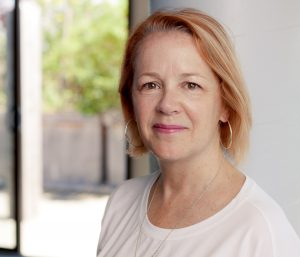 Laurie: The camping trip is one of those opportunities for cross-curricular integration. It’s self-directed learning that you get to see when it counts. During the school year they’re given an opportunity for a whole week of managing their time. They’re given all sorts of projects to work on independently through that week. The camping trip is another opportunity for that. They’re given lots of support. If they’re getting muddled, we’ll give them help to refine their ideas. Some of them take to it like a fish to water, and some of them flail, and it’s often surprising who those students turn out to be. The ones who are really good at following instruction are maybe not so good at taking an idea and figuring out how they’re going to approach it. It’s a great opportunity to see where they are in their learning.
Laurie: The camping trip is one of those opportunities for cross-curricular integration. It’s self-directed learning that you get to see when it counts. During the school year they’re given an opportunity for a whole week of managing their time. They’re given all sorts of projects to work on independently through that week. The camping trip is another opportunity for that. They’re given lots of support. If they’re getting muddled, we’ll give them help to refine their ideas. Some of them take to it like a fish to water, and some of them flail, and it’s often surprising who those students turn out to be. The ones who are really good at following instruction are maybe not so good at taking an idea and figuring out how they’re going to approach it. It’s a great opportunity to see where they are in their learning.
Wade: I think another thing that’s important about our camping trips it is that the students get to see the staff do exactly what they’re doing: pitch camp and make food. We have a good time together, and that kind of atmosphere is unmatched, really. You’re getting rained on just as much as they are. You’re managing these things together. That’s certainly one of the things that I reflect on and appreciate about being at the school: it’s just a really good time. Camping is very important for that, especially at that juncture of the year, at the end of September.
Don: They spend the entire week interdepending on each other.
Ariel: Tell me how you assess students. Do you have mainstream-style report cards, or do you do something different?
Wade: Straight-ahead traditional report cards.
Don: Even in the independent programs, the simulations, the games that we do, usually there is a formal component where there is testing and reports to hand in. They don’t mind doing it, because it’s all part of the game.
Wade: Ecoquest is filled with assessment.
Laurie: I do find the students, when they get that first report card, they often say, “Wow, it feels like it’s harder at this school.” Did you hear that this year?
Jason: I did, especially from the grade sevens. Since we take extended breaks from the classroom during the year, and we still have the same curriculum to cover as in a mainstream school, when we’re in class there’s a lot to work through. Especially in the first few months, the grade sevens are trying to figure out, “How much do I know about myself and my own learning and what works for me? How do I manage my time? How do I use an agenda?” All of that happens really quickly. By grade 8—on the first day I went to write the homework on the board and I heard all this movement behind me, and I thought, “Oh no, the second I turn my back …” but they were all taking out their agendas. That comes from grade 7, getting them used to the idea of managing their time.
John: During Ecology immersion we don’t do any French or Music, but then we drop everything else to do nothing but Music and Art just prior to the big show at Christmas time. And an awful lot of French gets covered when the whole school goes up to St. Donat, Quebec in January for a four-day immersion, a cross-curricular program that includes cross-country and downhill skiing, Québecois cultural activities indoors and outdoors, and research in the village. They get extra French before they go. So things get covered throughout the year, just not necessarily every day.
Wade: Intensives. “Work hard, play hard” is the subtext motto.
Don: I remember when we first put our letter of intent in to the Board, one of the things that was different about us was a variable timetable. We knew we wanted to focus intensively on different areas for two to four weeks at a time. That was something that other schools didn’t have.
Ariel: Tell me more about how physical activity fits in to the life of the school.
Wade: I taught swimming in the fall and in the spring. In the winter, every Wednesday afternoon the whole school would go down and play shinny and ice games. When you add that to the physical exercise that comes with camping trips and going to Quebec, they’re outside probably as much as they are indoors.
John: One year, Bob, one of our student teachers, ran a girls’ basketball team that won the city championship.
Wade: The same year we had a softball team. We got to the playoffs, and I had to say to them, “Look, if you beat this team, you won’t go to the city finals, because it’s the week of our camping trip.” They went out and won, and then they deferred to the losing team. They were fine with it, because they knew in advance, but I didn’t want to do that again because it defeated the purpose. It was not fair. But the one thing that worked for a time was cross-country.
Wade: There are set Phys. Ed. classes in the timetable. What we’ve described is the bigger picture of physical activity.
Don: When we first moved into the Withrow building, nobody at Withrow wanted to teach Phys. Ed. I came in as a Phys. Ed. specialist, and asked how much time I had in the gym. They said, “Whatever you want, Don.” I said, “Okay, let’s start with one-hour sessions three times a week for each class.” After school we had what we loosely called after-school sports, pickup sports. We’d go down to the gym four afternoons a week. That was a great thing for pulling the kids together. You didn’t have to have any skill; you just went down and had fun.
Wade: Another aspect of the kind of education we offer at Quest is performing and visual arts. A few years back our principal finally convinced us that we had to take our next half-time teacher, saying, “We’ve got just the person for you.” It turned out to be Laurie. She came with dance and drama experience. That was a real find.
Laurie: I introduced them to different kinds of international dance—Bollywood seemed to be a real hit, and that’s my love, too. We have a lot of fun. The sevens and eights are growing into their bodies. It’s kind of an awkward time. It’s also a time when you don’t really want to put yourself out there. With the Quest model we do lots of things in groups, so you’re very rarely on your own with other people watching you. Sometimes we have a little cross-curricular action with Drama. There was already this structure in place where the English classes were put in groups and they’d produce a play. They’d write an original script and then they’d perform it at the winter concert. What I was able to do in the Drama classes was to work towards the skills they needed in order to stand up in front of an audience.
Ariel: This idea of skill development—your website mentions a grade 8 self-assessment of readiness for high school. How does that work?
Jason: It’s ongoing throughout the year. For the grade eights at this time of year, all of their guidance is looking toward high school. Almost every piece of work they do has a self-assessment attached to it, an opportunity to reflect on their own learning and the assignment itself.
Wade: At reporting periods we have the students do self-assessment and goal-setting, which is an improvement on the Board’s model. It’s a guided process.
Jason: Students are always present for the parent-teacher interviews. We speak directly to them, and they speak to their own learning in front of their parents. That is our starting point: their own self-reflection on their goal-setting and how they feel their performance is reflected on the report card, what’s accurate and what’s not.
Wade: They get to know their own learning process.
Ariel: Do any of your graduates go on to alternative secondary schools?
Wade: Not immediately, because there are no alternative secondary schools until grade 10. There are probably ten to twelve different secondary schools that the eights depart to, which makes this time of year bittersweet. They’ve been a unit for two years, and it’s a breakup. Some of them will move on to alternative schools. They’ll have had their fill of the school where they’ve landed, and they’ll know what path they want to follow to complete high school.
Laurie: I’d like to say something about the size of Quest. For me that’s one of the greatest strengths. There are sixty-eight kids, thirty-four in each grade. We have a good staff ratio. Even though they’re big classes you always have another staff member who’s ready to receive a student who’s in crisis, or if there’s a parent who comes in and wants to talk, there’s a teacher who’s there to receive them. There are heightened emotions at that age, and few tools to deal with them. Being able to be there for the students is really helpful, and ultimately it helps the learning. You can deal with crises and then get back to class.
Jason: We have three and a half positions. In the mornings we have two teachers on and two off. A class of thirty-four is a lot of students, and if you have a behavioural issue, which does happen, in a typical classroom you’d pause the class and talk with the student outside while the others continue working. Here you can call one of the teachers who’s not in class and ask them to come speak with the student. You go back to the thirty-three other students who need your attention, while that issue is still getting the one-on-one attention that it also deserves. I feel like the students are ours collectively. That’s a huge bonus, having other teachers there to lean on and to be there for them when they need it, too.
Laurie: It’s like we’re in a permanent staff meeting, because we’re all in the same office, and you can talk about the students. Sometimes my other half-job in the same building, at Withrow, can be pretty isolating. You’re all by yourself and everyone else is busy. At Quest of course we’re busy too, but if you have three minutes you can talk to other people when you really need to. You can find out what the conversations are between the other teachers: what’s happening with students in other classes, when I’d better keep an ear to the ground.
Wade: Students come to realize they are constantly being processed. That’s one of the things I really appreciated, too: the constant staff meeting. There’s fun and enjoyment and repartée, but kids are being processed all the time.
Laurie: It’s good for kids to have easy access to a number of teachers. They’re not going to click with every teacher. You know the teacher who has a rapport with a certain student who’s maybe having problems. It might have happened in your class, but you know it would be more effective for them to talk it through with someone else. That’s a great strength of a small alternative school.
Jason: The teacher-student ratio one to seventeen. We see their personalities. We can connect with them more than we ever would at a mainstream school.
Don: You can get at the problems quicker.
John: The class size probably sounds large compared to other alternative schools you’ve interviewed. But it works really well. You need that number of people to make Mock Parliament work.
Jason: I think that goes back to the kids wanting to be there. If you were in a traditional middle school and you had thirty-four kids in a class, it would be a very different story.
John: We’re lucky in that we don’t get the same range of ability levels as at other schools.
Jason: We have parents who are very invested in their children’s education. The students are a little above average in most of their learning skills. So a classroom of thirty-four doesn’t feel that big.
Don: Quest was originally set up with three staff and roughly seventy students. From years three to eight we were under tremendous pressure to expand, because there wasn’t another soul in the third floor of our building. We had a waiting list of about a hundred and fifty every year. We could have easily tripled our size, but our argument was always, “We designed it small so that we get to know the kids well and they get to know us.”
Wade: It’s whole-child teaching.
John: We used to do an interview process, and then we went to a lottery system the year after families camped out in the schoolyard to get an interview.
Don: All the way down the street.
John: We just didn’t want that sort of publicity.
Don: It made a great picture, though: tents lined up right down the field in November.
Laurie: Seriously?
Wade: Parents huddled in the sleet on a Friday afternoon for a Saturday interview.
Don: The Board always considered that bad press.
Ariel: Do you still have that many people who enter the lottery?
Wade: A hundred and ten, a hundred and twenty for thirty-four places.
Jason: This year it was a hundred and thirty or so. These kids want to be here. They’ve chosen this path for a reason; they haven’t just ended up in your classroom. Coming from a traditional school, that’s the biggest thing I’ve noticed: these kids want to learn. By the end of grade 8 some of them want to get to a bigger environment, but in grade 7 they just want to soak it all up.
Don: Back in the old days, though, if you had a parent who stayed a night or two in a tent in November, man, were they committed to the program! Those years went so smoothly.
Jason: I want to mention the physical space. It’s only three classrooms and a large science area. During concert time a rolling wall gets pushed back, a stage gets created; all the hardware is already set up. A concert has a completely different feeling from academics because the configuration is entirely different. The environment affects how a kid reacts. We have a small space, but it doesn’t feel like it, and every bit of it is used perfectly.
Wade: It’s amazing to think that when you first got there that floor of the school was so empty. Now it’s chock-a-block.
Don: There were no cupboards, no windows, nothing. We spent a year sending kids under a great big tarpaulin to find books. We didn’t have a place to store them, so we put them all in the center and threw a big tarp over them.
Ariel: Were you at Withrow right from the beginning?
Don: Yes. We decided to go to there because we knew we wanted to use the nearby park, and it was pretty close to the subway.
John: It was central.
Don: It was nice because the principal who was there was very supportive of alternative schools in general. He knew us from Jesse Ketchum.
John: Ontario was the place in the world for education at the time, according to the world alternative press. There was This Magazine is About Schools, and I had read about Summerhill and A.S. Neill. The first job I was offered was teaching at Brockton High School. I came in just after an ex-Major from the army was there, and he’d turned everything back fifty years, so it was becoming a pretty horrible place. I was doing alternative things there, but I wasn’t supposed to be. Then I got in to Jesse Ketchum.
Don: Jesse Ketchum was a demonstration school, with two thousand people coming through every year. Mainly Russia, the U.S., and Japan.
John: They were doing some interesting things there. The principal had an interest in alternative-ish things.
Ariel: How did Jesse Ketchum become a demonstration school? Was that the choice of the principal?
Don: Retired Major R.J. Richardson was running it.
John: Another retired Major.
Don: He ran it just like a military institute. I was there as a student teacher, and then the Board put Don Urquhart in there to change it around and go with the new education model. But the new education model hadn’t yet gone up to grade 7 and 8. The one thing I often think back on is that I worked probably two or three times as hard going from being a regular classroom teacher to Quest, particularly in the early years. But I had five times as much fun as I ever would have had.
John: And the satisfaction.
Don: Mind you, back in those days you could do things. John and I took kids on a five-day canoe trip. There’s not a chance you could do that now. Actually we shocked the Board, because the Temiskaming thing had just happened. John and I had recently been certified in whitewater canoeing. The Board, doing their typical thing, didn’t veto anything. They’d throw a whole bunch of roadblocks up and finally you’d say, “To hell with it.” I handed the application in to the head of the Phys. Ed. department, and he didn’t even look at it. He handed it back and said, “You can’t go.” I said, “Read it again. We are well qualified.” They had a special Board meeting, and they couldn’t do anything, because we’d met the criteria.
John: Being a teacher in an alternative school has got to be way more work than in a regular school. Way more work, and no more pay. But it’s the satisfaction, I guess.
Wade: It’s energizing. You don’t mind doing all the extra work. When I got to Quest I felt I had finally arrived where I wanted to be. I had an interest in pursuing alternative education, but positions were not readily available; when you have a small staff people tend not to leave if they find themselves satisfied. I was very fortunate.





